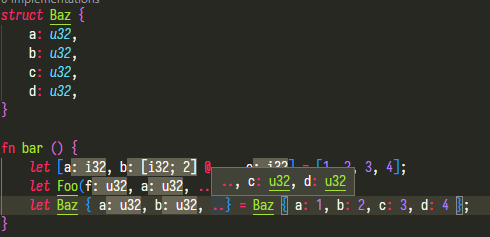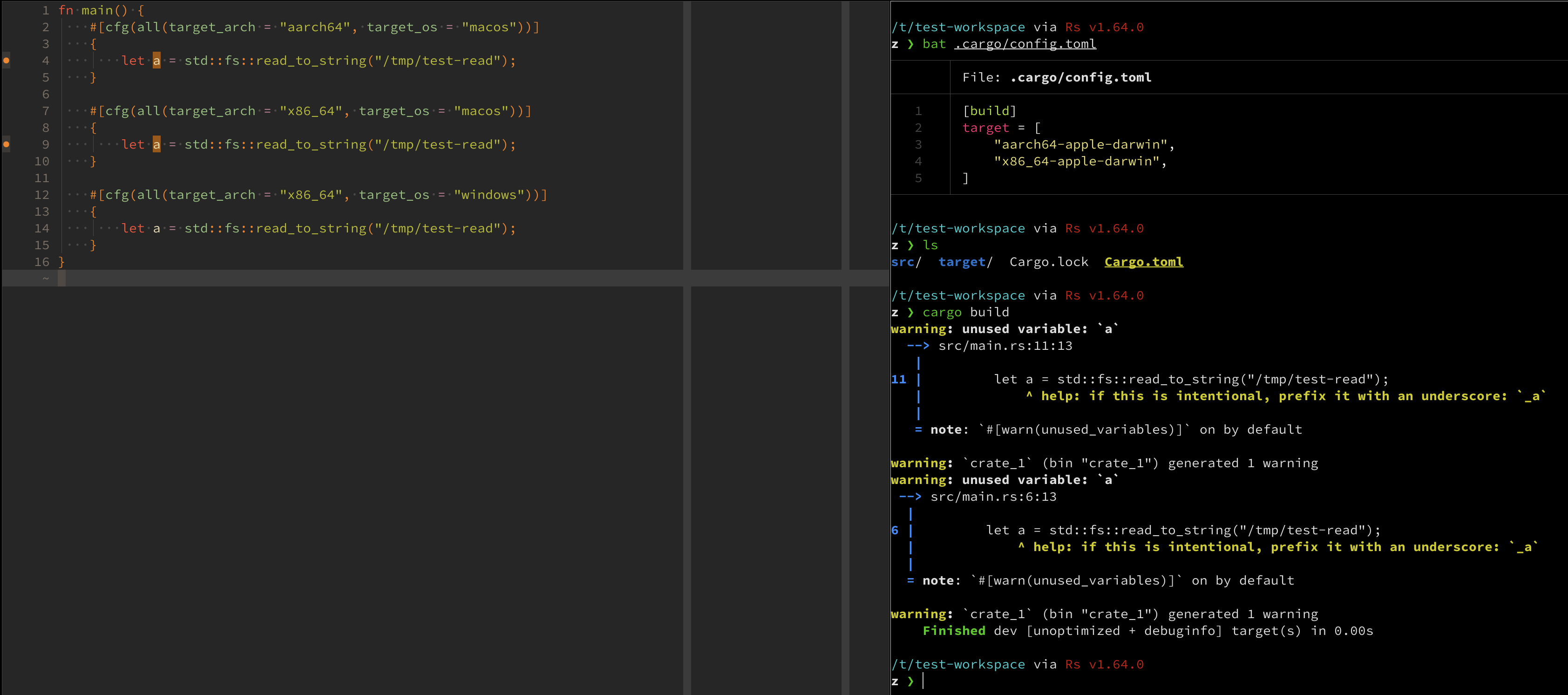Improve goto declaration
Closes https://github.com/rust-lang/rust-analyzer/issues/13599
- goto decl now goes to assoc items of trait declarations over the items of trait implementations
- goto decl now goes to the field declaration (opposed to goto def which shows both the field decl and binding created/local being used)
- also adds back the goto definition fallback that seems to have been dropped at some point.
feat: adds hover hint to ".." in record pattern
Hovering on the "rest" pattern in struct destructuring,
```rust
struct Baz {
a: u32,
b: u32,
c: u32,
d: u32
}
let Baz { a, b, ..$0} = Baz { a: 1, b: 2, c: 3, d: 4 };
```
shows:
```
.., c: u32, d: u32
```
Currently only works with struct patterns.

Add assist to generate trait impl's
resolves#13553
This pull request adds a `generate_trait_impl` assist, which generates trait impl's for a type. It is almost the same as the one to generate impl's and I also reduced the trigger range to only outside the `RecordFieldList`. Also moved all the tests into separate test functions. A few of the old tests seemed redundant, so I didn't port them.
Fix: Handle empty `checkOnSave/target` values
This fixes a regression introduced by #13290, in which failing to set `checkOnSave/target` (or `checkOnSave/targets`) would lead to an invalid config.
[Fixes#13660]
Support multiple targets for checkOnSave (in conjunction with cargo 1.64.0+)
This PR adds support for the ability to pass multiple `--target` flags when using
`cargo` 1.64.0+.
## Questions
I needed to change the type of two configurations options, but I did not plurialize the names to
avoid too much churn, should I ?
## Zulip thread
https://rust-lang.zulipchat.com/#narrow/stream/185405-t-compiler.2Frust-analyzer/topic/Issue.2013282.20.28supporting.20multiple.20targets.20with.201.2E64.2B.29
## Example
To see it working, on a macOS machine:
```sh
$ cd /tmp
$ cargo new cargo-multiple-targets-support-ra-test
$ cd !$
$ mkdir .cargo
$ echo '
[build]
target = [
"aarch64-apple-darwin",
"x86_64-apple-darwin",
]
' > .cargo/config.toml
$ echo '
fn main() {
#[cfg(all(target_arch = "aarch64", target_os = "macos"))]
{
let a = std::fs::read_to_string("/tmp/test-read");
}
#[cfg(all(target_arch = "x86_64", target_os = "macos"))]
{
let a = std::fs::read_to_string("/tmp/test-read");
}
#[cfg(all(target_arch = "x86_64", target_os = "windows"))]
{
let a = std::fs::read_to_string("/tmp/test-read");
}
}
' > src/main.rs
# launch your favorite editor with the version of RA from this PR
#
# You should see warnings under the first two `let a = ...` but not the third
```
## Screen

Helps with #13282
fix: format expression parsing edge-cases
- Handle positional arguments with formatting options (i.e. `{:b}`). Previously copied `:b` as an argument, producing broken code.
- Handle indexed positional arguments (`{0}`) ([reference](https://doc.rust-lang.org/std/fmt/#positional-parameters)). Previously copied over `0` as an argument.
Note: the assist also breaks when named arguments are used (`"{name}$0", name = 2 + 2` is converted to `"{}"$0, name`. I'm working on fix for that as well.
Update several crates to bring support for the new Tier 3 Windows tar…
`cargo t` has passed on Windows 11 with both `x86_64-pc-windows-gnu` and `x86_64-pc-windows-gnullvm` targets.
fix: check visibility of each path segment
Upon path resolution, we have not been checking if every def pointed to by each segment of the path is visible from the original module. This leads to incorrect import resolutions, in particular when one uses glob imports and names collide.
There is decent amount of changes in this PR because:
- some of our tests were not correct in terms of visibility
- I left several basic nameres tests as-is (with expect test updated) since I thought it would be nice to ensure we don't resolve defs that are not visible.
- `fix_visibility` assist relied on `Semantics::resolve_path()`, which uses the name resolution procedure I'm fixing and wouldn't be able to "see through" the items with strict visibility with this patch
The first commit is the gist of the fix itself.
Fixes#10991Fixes#11473Fixes#13252
Fix `tt::Punct`'s spacing calculation
Fixes#13499
We currently set a `tt::Punct`'s spacing to `Spacing::Joint` unless its next token is a trivia (i.e. whitespaces or comment). As I understand it, rustc only [sets `Spacing::Joint` if the next token is an operator](5b3e909075/compiler/rustc_parse/src/lexer/tokentrees.rs (L77-L78)) and we should follow it to guarantee the consistent behavior of proc macros.
Fix the length displayed for byte string literals with escaped newlines
This is a fix for the problem I reported earlier: "the length of byte strings containing escaped newlines is displayed two bytes longer when the first escaped character is a newline".
I would appreciate it if you could review the fix.
Many thanks.
Closes#13567
The length of byte strings containing escaped newlines is displayed two
bytes longer when the first escaped character is a newline.
This is due to a small bug in handling the first escaped newline in
string literals.
Closes#13567
Feat: extracted method from trait impl is placed in existing impl
**Before**
https://user-images.githubusercontent.com/1759192/183872883-3b0eafd2-d1dc-440e-9e66-38e3372f8b64.mp4
**After**
https://user-images.githubusercontent.com/1759192/183875769-87f34c7d-52f0-4dfc-9766-f591ee738ebb.mp4
Previously, when triggering a method extraction from within an impl trait block, then this would always create a new impl block for
the struct, even if there already is one. Now, if there is already an existing trait-less impl block, then it'll put the extracted method in there.
**Caveats**:
- It currently requires the target impl block to be non-empty. This limitation is because the current architecture takes a `node_to_insert_after` as reference for where to insert the extracted function. An empty impl block doesn't have such a reference node, since it's empty. It seems that supporting this requires a much larger and more complex change.
- This is my first contribution in rust, so apologies for any beginner mistakes.